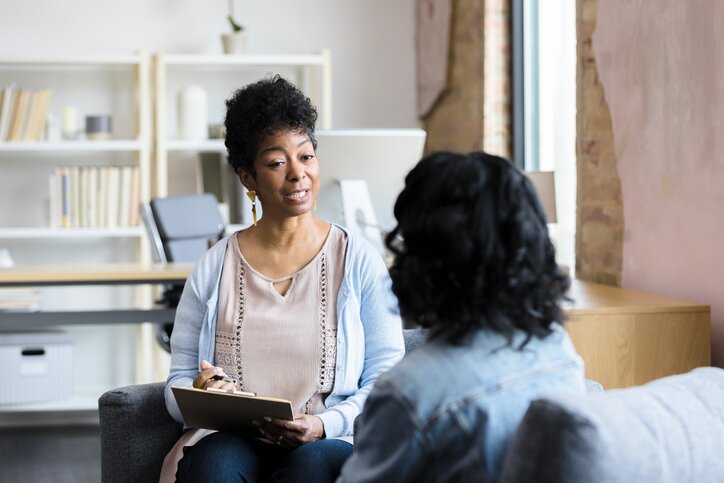Mental Health Stigma in the Black Community, How Far Have We Come?
The US Department of Health & Human Services reports that African American adults are 20 percent more likely to report serious mental health distress than their white adult counterparts.

With the myriad of issues to quality care in the black community, including, lack of trust in the medical world and systematic oppression, are blacks seeking out more mental health care than previous years?
In 2007, the National Library of Medicine called underutilized mental health services among Black people a serious problem. A 2013 study in Nursing Research Journal found that African Americans were not very open to acknowledging psychological problems and were concerned about stigma, especially Black men.
So, where does the Black Community currently stand with seeking mental health care? It’s 2023, and the cultural landscape in the United States continues to evolve. In 2021, the New York Times posted an article on the update of Black mental health. People of color are having a shared trauma experience in the United States. In the aftermath of the police killing of George Floyd in Minneapolis in 2020, mental health experts across the country say they have seen African-Americans seeking therapy in growing numbers. COVID-19 further increased anxiety and depression rates for African Americans.
Additionally, there has been a growing number of celebrities advocating for mental health treatment, including the actress Taraji P. Henson, Jada Pinkett Smith, Charlamagne Tha God, Jenifer Lewis, Big Sean, and Jay Z, to name a few. However, a 2022 National Library of Medicine Journal found that while fatigue, stress, anxiety, and depression increased in Black communities during the pandemic, so did the barriers to proper treatment.
This mental health awareness month, let us normalize therapy in the Black community. Here are some steps for people of color to consider when looking for mental health support:
1. Find A Culturally Competent Therapist
What does this mean? Make sure you find someone who understands the impact of the social and historical factors on your mental health and can create a safe space to talk about these race-related issues as they come up. There are several sites where you can find a Black therapist for mental health treatment:
- Black Therapist List, https://www.blacktherapistlist.com/
- Therapy for Black Girls, https://providers.therapyforblackgirls.com/
- Therapy for Black Men, https://therapyforblackmen.org/therapists/
- Black Female Therapists, https://www.blackfemaletherapists.com/directory/
2. Interview Your Therapist
Know your client rights! Your therapist should be someone you believe, over time, you can trust and be vulnerable with. It’s essential that you feel comfortable for growth in therapy to ignite. I recommend calling or setting up a quick video call so you can see and/or hear your therapist. It will also help you determine quicker if its a good match for your needs. Some questions to consider during the interview are:
- What do you understand about Black identity? Have you had experience in working with people of color?
- What is your practice's position on navigating oppression, systematic racism, and racial violence?
- Describe your knowledge about safety risks related to Black identity.
3. Think Outside The Box
If you are excited about starting therapy but are afraid you may not be able to afford the costs, think outside the box. Many companies have Employee Assistance Programs (EAP’s) that offer free, short-term counseling. Ask your Human Resources department about these resources. Additionally, if you have health insurance, simply call your provider for a listing of psychotherapists in your area. Lastly, group counseling is a great way to seek support and can be more economical. For people who are new to counseling and hesitant about opening up prematurely, a group can be a great way to get your feet wet, normalize your feelings, and gain support. Additionally, group counseling can cost half the going rate of individual therapy.
Following these steps can ensure a smooth transition into therapy. For more information, you can reach out to us, where you can schedule a consultation and talk about your counseling needs. We can help guide you through the steps above and share our mental health resources.
Happy Mental Health Awareness Month!
About Vaughn Greene Funeral Services: For more than 25 years, Vaughn Greene Funeral Services has been providing a ministry of care to Baltimore’s African American community. As a leading local, minority- and family-owned provider, we promise to provide our highest level of service and respect to families who entrust us to honor their loved ones. For more information about our funeral, cremation, memorial, repast, and grief counseling services, please call us at 410.655.0015 or visit us online at https://vaughncgreene.com/.
References:
- https://minorityhealth.hhs.gov/omh/browse.aspx?lvl=4&lvlid=24
- https://dworakpeck.usc.edu/news/why-mental-health-care-stigmatized-black-communities
- https://pubmed.ncbi.nlm.nih.gov/17404125/
- https://journals.lww.com/nursingresearchonline/Abstract/2013/05000/African_American_Men_and_Women_s_Attitude_Toward.6.aspx
- https://www.nytimes.com/2021/05/09/us/trauma-therapy-black-community.html
- https://www.essence.com/lifestyle/health-wellness/black-celebs-help-erase-mental-health-stigmas-encourage-therapy/#436020
- https://www.ncbi.nlm.nih.gov/pmc/articles/PMC9493150/
- https://www.healthline.com/health/mental-health/mental-health-in-the-black-community#effects
- https://therapy4thepeople.org/how-to-find-the-right-therapist-black/
- https://www.buzzfeednews.com/article/rheedawalker/black-mental-health-find-a-therapist










Comments